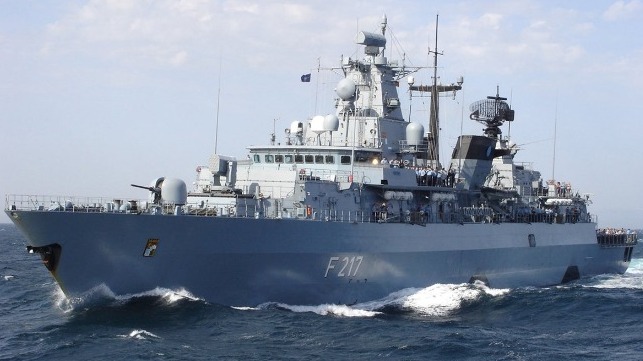German Frigate Departs for the South China Sea

On Monday, the German Navy dispatched the frigate Bayern on a long voyage to the South China Sea, showing its support for the multinational effort to offset Chinese expansionism in the region.
The trip will take seven months, and it will see Bayern joining a NATO exercise in the Mediterranean and the EUNAVOR anti-piracy mission off Somalia on her way east. She will call in Vietnam, South Korea, Japan and Australia in addition to transiting the South China Sea. China is not currently on Bayern's itinerary, and Chinese officials have said that they will not host the vessel unless Germany clarifies the frigate's mission.
Unlike U.S. Navy vessels, which periodically challenge Chinese maritime claims by passing close to Chinese-occupied islands, the Bayern is expected to stay near established shipping lanes. It is also expected to steer clear of the Taiwan Strait; U.S. Navy transits of the strait are widely interpreted as a message of support for an independent Taiwan, and they routinely draw criticism from Beijing.
"It's good to talk about our values, but it's even better to [show] it," said German Defence Minister Annegret Kramp-Karrenbauer in a statement. "Today the frigate Bayern is heading towards the Indo-Pacific - a sign of stability, prosperity and a rule-based, multilateral order . . . Together with our valued partners in the region, Germany is showing [its] presence in the Indo-Pacific and sets an example of solidarity."

that matters most
Get the latest maritime news delivered to your inbox daily.
While Bayern's mission is to send a message of opposition to China's sweeping maritime claims, some defense observers have expressed concern that the deployment could end up having the opposite effect. If Bayern should call in Shanghai before transiting the South China Sea - as has been previously discussed - it could be interpreted as a sign that Germany was asking Beijing's permission before entering contested waters.
"It illustrates [that] European naval deployments can actively undermine rather than help uphold international law or support a strategy of deterrence against China – in fact, they can even go so far as to strengthen Chinese territorial claims in Asia. Everything depends on the detail," wrote Chatham House senior fellow Hans Kundnani and Prof. Michito Tsuruoka of Keio University in a recent editorial.
